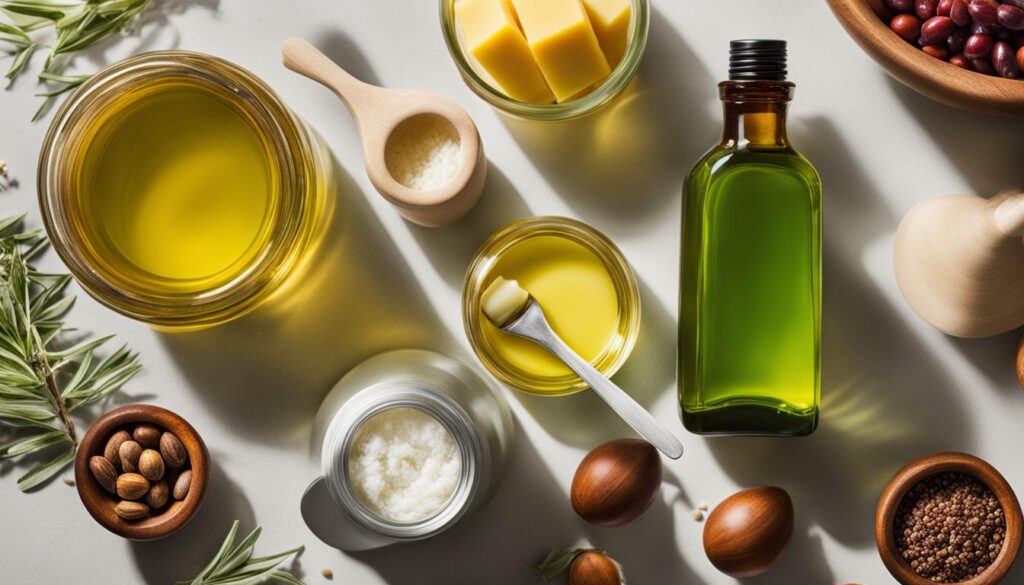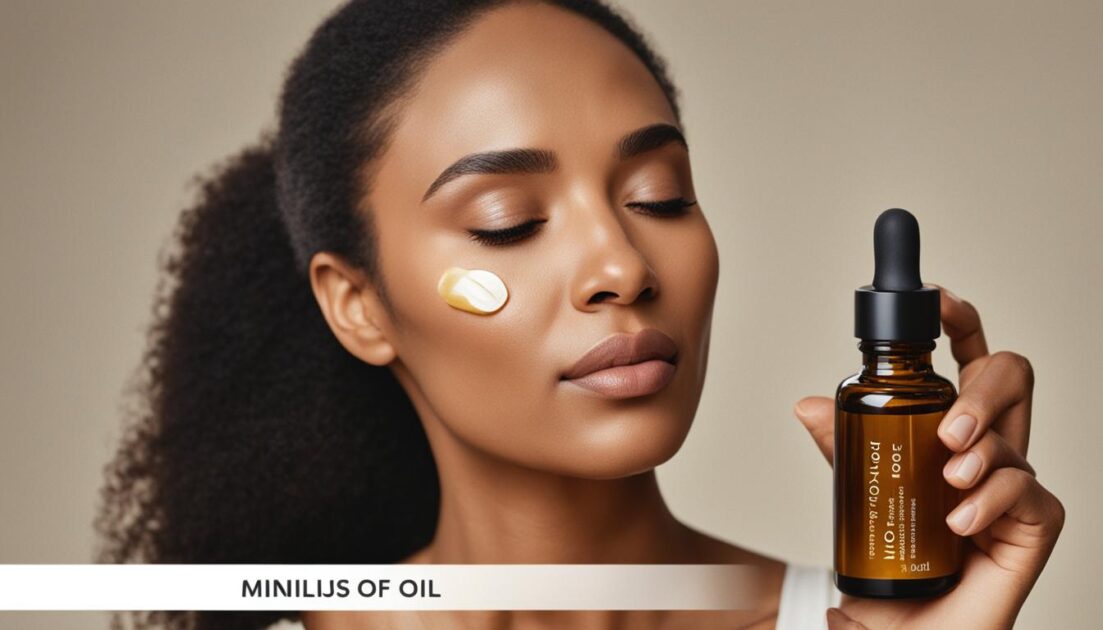When it comes to natural skincare and haircare, jojoba oil reigns supreme. This versatile ingredient derived from the seeds of the jojoba plant offers a multitude of uses and benefits, making it a must-have in your beauty routine.
Rich in vitamins, antioxidants, and fatty acids, jojoba oil is a powerhouse moisturizer that can nourish and protect both your skin and hair. Whether you’re looking to combat dryness, reduce acne, or rejuvenate your appearance, jojoba oil has got you covered.
When it comes to skincare, jojoba oil is a game changer. Its unique properties make it suitable for a multitude of concerns, including acne, dry skin, eczema, and more. Not only does it provide intense hydration, but it also boasts antibacterial and antioxidant benefits, making it an all-in-one solution for a healthy complexion.
For haircare, jojoba oil is equally impressive. Its moisturizing properties make it the perfect choice for dry, damaged hair, while its ability to balance oil production makes it suitable for all hair types. Whether used as a conditioning treatment or a frizz-fighting serum, jojoba oil can transform your locks and give you the luscious hair you’ve always dreamed of.
Key Takeaways:
- Jojoba oil is a versatile ingredient that offers numerous benefits for the skin and hair.
- It is rich in vitamins, antioxidants, and fatty acids, making it an effective moisturizer and protector.
- Jojoba oil can be used to treat acne, dry skin, eczema, and other common skin concerns.
- It is also highly beneficial for haircare, providing moisture, and improving overall hair health.
- When choosing jojoba oil, opt for organic, cold-pressed varieties for maximum skincare benefits.
The Jojoba Plant: History and Origin

The jojoba plant, scientifically known as Simmondsia chinensis, is a woody shrub native to the southwestern United States, Baja California, and Mexico. It is well-adapted to thrive in harsh desert climates. The plant produces a fruit resembling a large coffee bean or acorn.
Native Americans in the Sonora desert have long utilized the jojoba fruit and its oil for various medicinal purposes, particularly for treating skin and scalp conditions. Jojoba oil is extracted from the seeds found within the fruit through a cold press method. It is chemically classified as a liquid wax due to its high wax content.
“The jojoba plant has a rich history and has been used by Native Americans for centuries.”
The oil is rich in antioxidants, vitamins, and fatty acids, making it highly beneficial for skincare. It closely resembles the natural oils produced by our skin, allowing it to penetrate deeply and provide nourishment.
Properties and Key Components of Jojoba Oil

Jojoba oil is a versatile skincare ingredient known for its nourishing and moisturizing properties. It is primarily composed of jojoba wax, which makes up about 98% of its chemical composition. Jojoba wax is a unique component that closely resembles human skin sebum, making it an excellent skin softener. Here are the key components that give jojoba oil its beneficial properties:
- Jojoba Wax: Jojoba oil is predominantly made up of jojoba wax, which provides excellent moisturization and skin softening benefits.
- Free Fatty Acids, Alcohols, and Sterols: These components contribute to the oil’s nourishing and conditioning properties, helping to improve skin elasticity and prevent flakiness.
- Antioxidants: Jojoba oil contains antioxidants that help protect the skin from oxidative stress caused by environmental pollutants and toxins, promoting a healthier complexion.
- Vitamins: Approximately 79% of the vitamins in jojoba oil are vitamin E, which is known for its antioxidant and moisturizing properties. Jojoba oil also contains fat-soluble vitamins that nourish the skin.
The combination of these components makes jojoba oil a valuable ingredient in skincare products. Its ability to moisturize the skin, prevent flakiness, and protect against environmental damage makes it suitable for various skin types.
Jojoba Oil in Comparison to Human Skin Sebum
“Just as Nature provided us with sebum to moisturize and protect our skin, the properties of jojoba oil closely resemble the natural sebum, making it an ideal natural moisturizer.”
Due to the similarities between jojoba oil and human skin sebum, jojoba oil is readily absorbed by the skin without leaving a greasy residue. It seeps into the skin, delivering nourishment and hydration to the deeper layers. This makes it an excellent choice for those with dry or dehydrated skin, as well as individuals seeking a natural moisturizer that mimics the skin’s natural oils.
The image above illustrates the properties and key components of jojoba oil, showcasing its nourishing and moisturizing effects on the skin.
Natural Usage for Culinary and Personal Products

When it comes to jojoba oil, its uses extend far beyond skincare and hair care. While it is primarily known for its moisturizing and nourishing properties, jojoba oil can also be utilized in culinary and personal products to enhance the overall experience.
- Culinary Uses: Although less common, jojoba oil can be a valuable ingredient in the kitchen. Its mild, nutty flavor makes it a suitable addition to salad dressings, marinades, and various other dishes. Jojoba oil can also be used as a cooking oil, offering a healthier alternative to traditional oils due to its low saturated fat content.
- Personal Products: In personal care products, jojoba oil is revered for its noncomedogenic nature. This means it won’t clog pores or contribute to acne breakouts, making it an excellent choice for various skincare and hair care applications. Jojoba oil is commonly found in moisturizers, lip balms, makeup removers, and even hair conditioners. Its ability to nourish and soften the skin and hair fibers makes it a go-to ingredient in natural, non-toxic products.
Noncomedogenic Oil for Healthy, Radiant Skin
“Jojoba oil is a game-changer in the world of skincare. Its noncomedogenic properties make it ideal for people with oily or acne-prone skin, as it won’t clog pores or cause breakouts. Plus, its natural moisturizing abilities leave your skin feeling soft, supple, and radiant.”
Moreover, jojoba oil is packed with essential fatty acids and antioxidants, which provide additional benefits for the skin. These components help to protect against environmental stressors and contribute to a healthier complexion over time.
It’s important to note that when using jojoba oil for culinary or personal purposes, it’s recommended to choose high-quality, organic options to ensure the best results.
| Culinary Uses | Personal Products |
|---|---|
| Salad dressings | Moisturizers |
| Marinades | Lip balms |
| Cooking oil | Makeup removers |
Household and Other Topical Uses of Jojoba Oil
Jojoba oil is not only beneficial for skincare and hair care, but it also has various household and topical applications. Its versatility extends beyond beauty routines, making it a handy and practical ingredient to have at home.
Household Uses of Jojoba Oil
When it comes to household uses, jojoba oil can serve as a natural lubricant for various mechanical purposes. Its lubricating properties make it suitable for locks, hinges, or any mechanisms that require smooth operation. Additionally, jojoba oil can be used as a wood conditioner to restore and maintain the luster of wooden furniture.
Here are some common household applications of jojoba oil:
- As a natural lubricant for locks, hinges, and other mechanical purposes.
- As a wood conditioner to restore and maintain the luster of wooden furniture.
- As a remover for sticky residue, such as price tags or adhesive marks.
- As a natural leather conditioner to keep leather goods like shoes, bags, or belts in good condition.
- As a polish for metals to remove tarnish and restore shine.
With its moisturizing properties, jojoba oil can enhance the condition of leather and prevent it from drying or cracking. Its gentle yet effective cleaning attributes make it a safe choice for polishing metals and removing dirt or grime.
Topical Uses of Jojoba Oil
In addition to its household uses, jojoba oil is also effective in various topical applications that go beyond skincare and hair care.
“I’ve been using jojoba oil as a natural lubricant for my bike chain, and it has been working great. It keeps the chain running smoothly, and I don’t have to worry about any harmful chemicals or residues.” – Bike enthusiast
Here are some topical uses of jojoba oil:
- As a natural lubricant for mechanical purposes.
- As a conditioner and protector for wooden furniture.
- As a remover for sticky residue.
- As a natural leather conditioner.
- As a polisher for metals.
- As an ingredient in homemade cleaning products to enhance their effectiveness.
Jojoba oil’s natural lubricating properties make it suitable for mechanical purposes, whether it’s a squeaky lock or a rusty hinge. It can also be incorporated into homemade cleaning products, adding an extra touch of effectiveness to your cleaning routine.
Next, we will explore the specific benefits and applications of jojoba oil for the skin.
Benefits and Applications of Jojoba Oil for Skin

Jojoba oil offers a range of benefits for the skin. Its moisturizing properties make it effective for treating dry skin, reducing flakiness, and preventing bacterial infections. Jojoba oil’s antibacterial and antifungal properties make it beneficial for acne-prone skin, helping to combat bacteria that can lead to breakouts. The oil is also an antioxidant, which helps the skin fight oxidative stress caused by environmental pollutants.
Jojoba oil is noncomedogenic and hypoallergenic, making it suitable for all skin types without clogging pores or causing irritation. It can help control sebum production, soothe eczema and psoriasis, minimize the appearance of scars, and promote collagen synthesis. Jojoba oil is commonly used as a facial moisturizer, makeup remover, or as an ingredient in DIY skincare masks and treatments.
| Benefits of Jojoba Oil for Skin | Applications |
|---|---|
| Moisturizes dry skin | Facial moisturizer |
| Reduces flakiness | Makeup remover |
| Prevents bacterial infections | DIY skincare masks |
| Combats acne | |
| Soothes eczema and psoriasis | |
| Minimizes the appearance of scars | |
| Promotes collagen synthesis |
Benefits and Applications of Jojoba Oil for Hair

Jojoba oil is a versatile and beneficial ingredient for hair care. Its unique properties make it an excellent choice for hair conditioning, addressing issues such as dryness, dandruff, and scalp psoriasis. Let’s explore the benefits and applications of jojoba oil for hair:
1. Hair Conditioning:
Jojoba oil acts as a natural hair conditioner, providing hydration and softness to the hair strands. It helps prevent protein loss and breakage, making the hair appear healthier and more manageable. By applying jojoba oil to the hair, you can protect it from external damage and restore its natural shine.
2. Combatting Dandruff:
Jojoba oil forms a protective barrier around the scalp, moisturizing it and preventing the skin from flaking. It helps reduce dryness and itching associated with dandruff, providing relief and promoting a healthier scalp. Regular use of jojoba oil can help eliminate dandruff and prevent its recurrence.
3. Soothing Scalp Psoriasis:
Scalp psoriasis can cause uncomfortable symptoms such as redness, itching, and flaking. Jojoba oil’s moisturizing and calming properties can help soothe these symptoms and reduce scalp inflammation. It creates an environment that supports healthier scalp conditions, minimizing the discomfort associated with scalp psoriasis.
4. Leave-in Conditioner and Hair Care:
Jojoba oil can be used as a leave-in conditioner by applying a small amount to the hair after washing. It can also be mixed with other hair care products, such as shampoos, conditioners, or styling products, to enhance their effectiveness and provide extra nourishment.
By leveraging the benefits of jojoba oil for hair, you can achieve stronger, healthier, and more vibrant locks. Its moisturizing and soothing properties make it an ideal choice for addressing various hair concerns.
Usage Tips and Cautions for Jojoba Oil
Jojoba oil is a versatile and safe option for topical use, offering a range of benefits for the skin and hair. Here are some essential usage tips and cautions to consider when incorporating jojoba oil into your skincare and beauty routine.
Perform a Patch Test
Before using jojoba oil or any new cosmetic product, it is important to perform a patch test to check for any allergic reactions. To do a patch test:
- Apply a small amount of jojoba oil to the inner forearm.
- Cover the area with a bandage.
- Wait for 24 hours and observe for any signs of irritation, redness, or hives.
If there are no adverse reactions, you can safely proceed with using jojoba oil.
Versatile Application
Jojoba oil can be used in various ways depending on your desired result:
- Moisturizer: Apply a few drops of jojoba oil directly to the skin to moisturize and nourish.
- Lip balm: Dab a small amount of jojoba oil onto your lips to keep them hydrated and smooth.
- Makeup remover: Use a cotton pad or a soft cloth soaked in jojoba oil to gently remove oil-based makeup.
- Hair conditioner: Apply a small amount of jojoba oil to damp hair or mix it with your regular conditioner to soften and protect your strands.
Jojoba oil is safe to use around the eye area and is often used as a natural and effective makeup remover.
Discontinue Use If Adverse Reactions Occur
While jojoba oil is generally safe for most individuals, it is important to discontinue use if any adverse reactions, such as redness, itching, or irritation, occur. If you experience any discomfort after using jojoba oil, it is recommended to consult a healthcare professional.
By following these tips and cautions, you can safely and effectively incorporate jojoba oil into your skincare and beauty routine, enjoying its numerous benefits for your skin and hair.
Best Quality Selection and Storage of Jojoba Oil

When it comes to jojoba oil, selecting the best quality oil is crucial to ensure you enjoy its maximum benefits. The market offers a variety of options, but opting for organic, cold-pressed jojoba oil is highly recommended.
Organic jojoba oil is derived from plants that have been grown without the use of synthetic pesticides, herbicides, or fertilizers. Choosing organic ensures that the oil is free from harmful chemicals, making it a healthier choice for your skin and hair. Organic jojoba oil is also more environmentally friendly, supporting sustainable farming practices.
The cold-pressed extraction method is another important aspect to consider. This method involves pressing the jojoba seeds at a low temperature, preserving the oil’s natural properties and retaining a higher concentration of antioxidants. The cold-pressing process ensures that the oil is not degraded by heat or chemical solvents, resulting in a superior quality product.
Table: Comparison of Different Types of Jojoba Oil
| Type of Jojoba Oil | Extraction Method | Quality | Benefits |
|---|---|---|---|
| Organic Cold-Pressed Jojoba Oil | Cold-pressed | Highest | Rich in antioxidants, nourishing and moisturizing for skin and hair |
| Heat-Pressed Jojoba Oil | Heat-pressed | Moderate | Some loss of antioxidants, still beneficial for skin and hair |
| Chemically Expelled Jojoba Oil | Chemical extraction | Lowest | Lower antioxidant content, less beneficial for skincare |
Proper Storage of Jojoba Oil
To maintain the quality and extend the shelf life of your jojoba oil, proper storage is essential. Follow these tips:
- Keep the oil in a cool, dark place. Exposure to direct sunlight and heat can degrade the oil and reduce its effectiveness. Consider storing it in a cabinet, pantry, or refrigerator.
- Avoid fluctuating temperatures. Extreme temperature changes can impact the oil’s stability and potency. Find a spot that maintains a consistent temperature.
- Choose a tinted or opaque container. Light can also degrade the quality of jojoba oil, so selecting a container that protects from light exposure is ideal.
- Ensure the container is tightly sealed. Oxygen can oxidize the oil and diminish its quality. Make sure the lid or cap is secure to prevent unnecessary exposure to air.
By following these storage recommendations, you can ensure that your jojoba oil remains fresh, potent, and ready to provide its nourishing benefits whenever you need it.
Potential Side Effects and Risks of Jojoba Oil

While jojoba oil is generally considered safe for topical use, it is important to be aware of potential side effects and risks. Although rare, some individuals may experience allergic reactions to jojoba oil. Symptoms can include hives, itching, redness, and skin irritation. To determine if you have an allergic reaction, it is recommended to perform a patch test before using jojoba oil for the first time. Apply a small amount of jojoba oil to a small area of your skin, such as the inner forearm, and wait for 24 hours to observe any adverse reactions. If you experience any discomfort or irritation, discontinue use and consult a healthcare professional.
It is important to note that jojoba oil is intended for external use only and should not be ingested. Consumption of jojoba oil can lead to digestive issues such as stomach discomfort and fatty stools. If accidental ingestion occurs, it is advised to seek medical attention.
Side Effects and Risks Summary:
| Side Effects | Risks |
|---|---|
| Allergic reactions | Potential for skin irritation and discomfort |
| Not suitable for ingestion | Potential digestive issues if consumed |
It is essential to exercise caution when using any new skincare or hair care product, including jojoba oil. If you have existing skin conditions, sensitive skin, or any concerns regarding the use of jojoba oil, it is advisable to consult a dermatologist or healthcare professional before incorporating it into your routine.
Popular Jojoba Oil Products to Try
When it comes to popular jojoba oil products, there are several well-known brands that offer high-quality options for both skincare and hair care. One such brand is ArtNaturals, known for its organic and cold-pressed jojoba oil. Their oil is rich in vitamins, antioxidants, and fatty acids, making it an excellent choice for moisturizing the skin and nourishing the hair.
Leven Rose is another reputable brand that offers organic jojoba oil. Their oil is cold-pressed and unrefined, ensuring the preservation of its natural properties. Leven Rose jojoba oil is especially popular for its versatility, as it can be used for various purposes including skin moisturization, hair conditioning, and nail care.
NOW Solutions is a trusted brand that offers high-quality, organic jojoba oil. Their oil is certified organic and derived from sustainably sourced jojoba seeds. NOW Solutions jojoba oil is often praised for its lightweight and non-greasy texture, making it ideal for all skin types.
For those seeking a trustworthy option, Cliganic is a brand worth considering. Their jojoba oil is USDA certified organic and cold-pressed to retain its maximum benefits. Cliganic jojoba oil is known for its purity and effectiveness in moisturizing the skin and promoting healthy hair.
FAQ
What are the uses of jojoba oil?
Jojoba oil has many uses and benefits for both the skin and hair. It can be used as a moisturizer, makeup remover, lip balm, hair conditioner, and more.
What are the benefits of jojoba oil for the skin?
Jojoba oil is moisturizing, antibacterial, and antioxidant-rich, making it effective for treating dry skin, acne, eczema, and more. It can also reduce the appearance of scars and wrinkles.
How can jojoba oil be used for haircare?
Jojoba oil can be used as a hair conditioner to soften and protect the hair. It can also help with scalp conditions such as dandruff and psoriasis.
How should jojoba oil be used?
Jojoba oil can be applied directly to the skin or hair, or mixed with other ingredients. It is safe to use around the eyes and does not require dilution like some other oils.
What is the best quality jojoba oil?
It is recommended to choose organic, cold-pressed jojoba oil for maximum skincare benefits. Proper storage in a cool, dark place is also important to maintain its quality.
Are there any potential side effects of jojoba oil?
Jojoba oil is generally safe to use, but allergic reactions can occur in rare cases. It is important to perform a patch test before use and discontinue if any adverse reactions occur.
What are some popular jojoba oil products to try?
Some popular brands that offer organic jojoba oil include ArtNaturals, Leven Rose, NOW Solutions, and Cliganic. These brands offer high-quality options for skincare and hair care.






